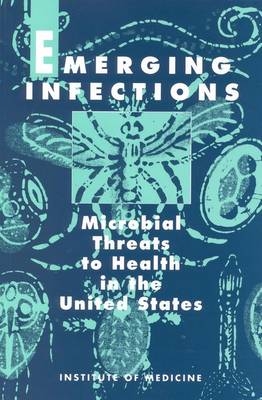
Emerging Infections
Microbial Threats to Health in the United States
Seiten
1992
National Academies Press (Verlag)
978-0-309-04741-8 (ISBN)
National Academies Press (Verlag)
978-0-309-04741-8 (ISBN)
Identifies infectious disease threats posed by bacteria and viruses, as well as protozoans, helminths, and fungi. This volume includes a historical perspective on infectious disease, with focuses on Lyme disease, peptic ulcer, malaria, dengue, and recent increases in tuberculosis.
The emergence of HIV disease and AIDS, the reemergence of tuberculosis, and the increased opportunity for disease spread through international travel demonstrate the critical importance of global vigilance for infectious diseases.
This volume highlights risk factors for the emergence of microbial threats to health, warns against complacency in public health, and promotes early prevention as a cost-effective and crucial strategy for maintaining public health in the United States and worldwide.
The volume identifies infectious disease threats posed by bacteria and viruses, as well as protozoans, helminths, and fungi. Rich in information, it includes a historical perspective on infectious disease, with focuses on Lyme disease, peptic ulcer, malaria, dengue, and recent increases in tuberculosis.
The panel discusses how "new" diseases arise and how "old" ones resurge and considers the roles of human demographics and behavior, technology and industry, economic development and land use, international travel and commerce, microbial adaptation and change, and breakdown of public health measures in changing patterns of infectious disease.
Also included are discussions and recommendations on disease surveillance; vaccine, drug, and pesticide development; vector control; public education and behavioral change; research and training; and strengthening of the U.S. public health system.
This volume will be of immediate interest to scientists specializing in all areas of infectious diseases and microbiology, healthy policy specialists, public health officials, physicians, and medical faculty and students, as well as anyone interested in how their health can be threatened by infectious diseases.
Table of Contents
FRONT MATTER
EXECUTIVE SUMMARY
1 BACKGROUND
2 FACTORS IN EMERGENCE
3 ADDRESSING THE THREATS
REFERENCES
APPENDIXES
A TASK FORCES
B CATALOG OF EMERGING INFECTIOUS DISEASE AGENTS
C GLOBAL RESOURCES FOR INFECTIOUS DISEASE SURVEILLANCE
D COMMITTEE AND STAFF BIOGRAPHIES
GLOSSARY
ACRONYMS AND ABBREVIATIONS
INDEX
The emergence of HIV disease and AIDS, the reemergence of tuberculosis, and the increased opportunity for disease spread through international travel demonstrate the critical importance of global vigilance for infectious diseases.
This volume highlights risk factors for the emergence of microbial threats to health, warns against complacency in public health, and promotes early prevention as a cost-effective and crucial strategy for maintaining public health in the United States and worldwide.
The volume identifies infectious disease threats posed by bacteria and viruses, as well as protozoans, helminths, and fungi. Rich in information, it includes a historical perspective on infectious disease, with focuses on Lyme disease, peptic ulcer, malaria, dengue, and recent increases in tuberculosis.
The panel discusses how "new" diseases arise and how "old" ones resurge and considers the roles of human demographics and behavior, technology and industry, economic development and land use, international travel and commerce, microbial adaptation and change, and breakdown of public health measures in changing patterns of infectious disease.
Also included are discussions and recommendations on disease surveillance; vaccine, drug, and pesticide development; vector control; public education and behavioral change; research and training; and strengthening of the U.S. public health system.
This volume will be of immediate interest to scientists specializing in all areas of infectious diseases and microbiology, healthy policy specialists, public health officials, physicians, and medical faculty and students, as well as anyone interested in how their health can be threatened by infectious diseases.
Table of Contents
FRONT MATTER
EXECUTIVE SUMMARY
1 BACKGROUND
2 FACTORS IN EMERGENCE
3 ADDRESSING THE THREATS
REFERENCES
APPENDIXES
A TASK FORCES
B CATALOG OF EMERGING INFECTIOUS DISEASE AGENTS
C GLOBAL RESOURCES FOR INFECTIOUS DISEASE SURVEILLANCE
D COMMITTEE AND STAFF BIOGRAPHIES
GLOSSARY
ACRONYMS AND ABBREVIATIONS
INDEX
Joshua Lederberg, Robert E. Shope, and Stanley C. Oaks, Jr., Editors; Committee on Emerging Microbial Threats to Health, Institute of Medicine
1 FRONT MATTER; 2 EXECUTIVE SUMMARY; 3 1 BACKGROUND; 4 2 FACTORS IN EMERGENCE; 5 3 ADDRESSING THE THREATS; 6 REFERENCES; 7 APPENDIXES; 8 A TASK FORCES; 9 B CATALOG OF EMERGING INFECTIOUS DISEASE AGENTS; 10 C GLOBAL RESOURCES FOR INFECTIOUS DISEASE SURVEILLANCE; 11 D COMMITTEE AND STAFF BIOGRAPHIES; 12 GLOSSARY; 13 ACRONYMS AND ABBREVIATIONS; 14 INDEX
| Erscheint lt. Verlag | 1.2.1992 |
|---|---|
| Verlagsort | Washington |
| Sprache | englisch |
| Maße | 152 x 229 mm |
| Themenwelt | Medizin / Pharmazie ► Medizinische Fachgebiete ► Mikrobiologie / Infektologie / Reisemedizin |
| Studium ► Querschnittsbereiche ► Epidemiologie / Med. Biometrie | |
| ISBN-10 | 0-309-04741-2 / 0309047412 |
| ISBN-13 | 978-0-309-04741-8 / 9780309047418 |
| Zustand | Neuware |
| Haben Sie eine Frage zum Produkt? |
Mehr entdecken
aus dem Bereich
aus dem Bereich
ein überfälliges Gespräch zu einer Pandemie, die nicht die letzte …
Buch | Hardcover (2024)
Ullstein Buchverlage
24,99 €


